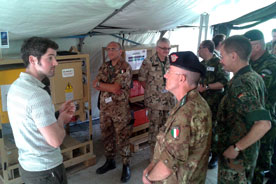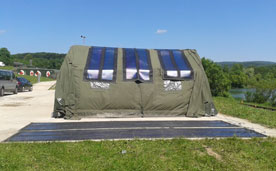‘Smart Energy’ camp opens eyes to promising energy-saving solutions
Energy-efficient equipment and materials were showcased recently at a demonstration camp set up at the military exercise “Capable Logistician 2013” in Slovakia in June. Over 500 visitors had their eyes opened to the security issues surrounding fuel supplies for deployed forces as well as to potential energy efficiency concepts and projects for the military.

Representatives of the British Ministry of Defence explain an intelligent power storage and management system.
Fuel convoys in Afghanistan have often come under attack and suffered casualties. “We are trying to make soldiers and commanders understand that saving energy has a direct effect on soldiers’ lives and security. It frees up capabilities for NATO’s core mission that are currently diverted for protecting fuel convoys,” explained Dr Susanne Michaelis, Smart Energy Action Officer at NATO Headquarters.

Samples of solar cells are placed on a standard Dutch tent that was set up at CL13.
Germany, the Netherlands and the United Kingdom contributed equipment and materials to the ‘Smart Energy’ camp, including insulation for tents, an intelligent power storage and management system, solar panels and energy-saving light-emitting diode (LED) lights.
Reducing fuel consumption
One VIP visitor, Slovak President Ivan Gašparovič, was particularly interested in a Dutch initiative for producing electricity through solar cells.
“By using the sunshine during the past three days of the exercise, we produced about 35 kWh, most of which is fed into the Slovak power grid,” explained Lt Col Harm Renes, an expert from the Royal Netherlands Army. “Last year in Afghanistan, we installed 480 square metres of solar panels which currently produce 200 kWh per day. The investment has already paid off.”

The team of the CL13 Smart Energy camp included representatives of the British Ministry of Defence, the Royal Dutch Army, the German Fraunhofer Institute Chemical Technology and NATO.
Tom Barker of the UK Ministry of Defence demonstrated an intelligent power storage and management system that has proved successful in reducing fuel consumption in the British project ‘POWER Forward Operating Base’ (POWER FOB). The system allows the incorporation of any renewable energy source and energy-saving technologies.
“POWER FOB proved that this power management system could typically save up to 30 per cent of fuel by storing the electricity produced by diesel generators and solar panels and redistributing it when and where required,” explained Mr Barker.
In addition, the POWER FOB project has shown that insulation material, load prioritisation and training could reduce diesel consumption in military camps even further. There are currently about 100 forward operating bases in Afghanistan, some of which could greatly benefit from such a system.
The Fraunhofer Institute for Chemical Technology, Pfinztal, Germany demonstrated a prototype of a portable hydrogen fuel cell that generates 2 kW of electricity, which was developed for the German Bundeswehr.
“The hydrogen needed to fuel the cell can be produced using solar energy to split water into oxygen and hydrogen – a silent and environmentally friendly process,” said Dr Karsten Pinkwart. In future, such light-weight fuel cells could replace heavy diesel generators with the same dimension and power output.
Identifying best practices
In addition to raising awareness, the Smart Energy camp had another important goal: to help NATO’s Smart Energy Team (SENT) to formulate recommendations for improving NATO’s standards and best practices on saving energy.
Set up after the Chicago Summit in May 2012 and financed through the NATO Science for Peace and Security Programme, SENT is jointly directed by the Lithuania-based NATO Energy Security Centre of Excellence and by the Joint Environment Department of the Swedish Armed Forces. It is made up of experts from eight nations, including six Allies (Canada, Germany, Lithuania, the Netherlands, the United Kingdom and the United States) and two partners (Australia and Sweden).
The Team’s overarching goal is to identify the most promising energy-saving solutions and initiate multinational projects to make such solutions work together easily.
